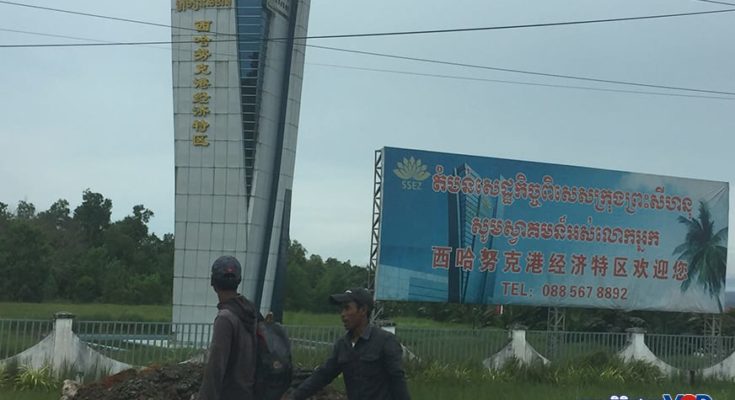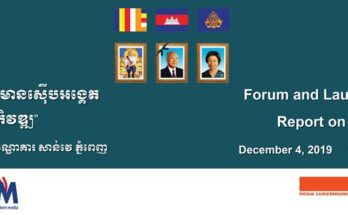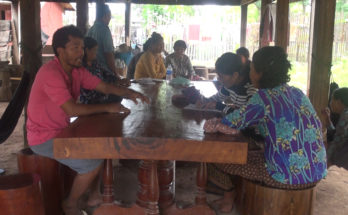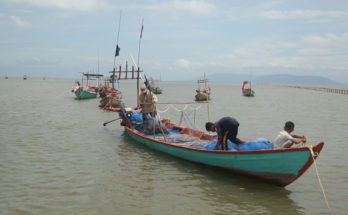(Photo: Sihanoukville Special Economic Zone taken on September 9, 2018.) In its recent report on the 2017 performance and the 2018 targets, the Ministry of Labor and Vocational Training indicated that some 88% of enterprises had infirmaries inside their compound, 33% having canteens, 21% having breastfeeding rooms, and 28% having nurseries. According to the same report, a total of 962 professional organizations had been registered including 793 basic unions, 138 union federations, 23 free trade unions, and 8 employers’ associations. In 2017, the report said, 127 collective labor disputes were solved and this represented an 80% decrease from the previous year.
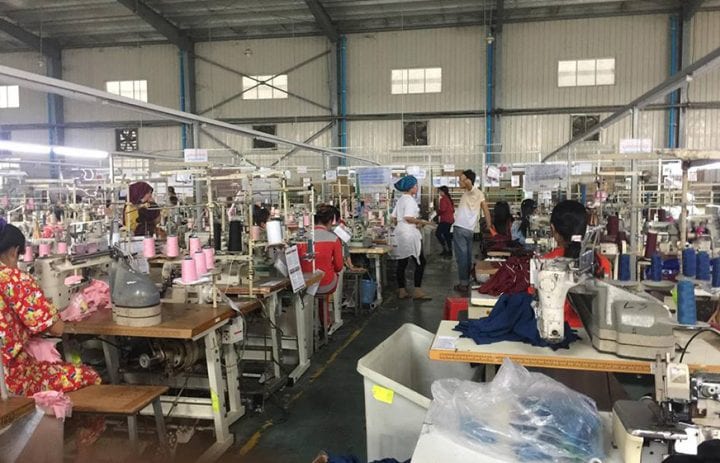
In 2008, the Royal Government of Cambodia permitted the Sihanoukville Special Economic Zone to open. Ten years since its inception, the SEZ has had 125 factories-enterprises operating. However, workers and unions said almost all factories discriminated against independent unions.
The Sihanoukville Special Economic Zone
According to a 2017 research by the American Center for International Labor Solidarity, there are 7 special economic zones in Sihanoukville province that received a license from the government. However, only the Sihanoukville Special Economic Zone that has been most active.
The research said the Sihanoukville SEZ is privately and legally managed by a company owned by Oknha Lao Meng Khin. He is a senator from the Cambodian People’s Party (CPP) and his wife is Cheung Sopheap aka Yeay Phou. The couple’s company has also received the concession right over Beung Kak Lake for a period of 99 years.
In March 17, 2008, the Royal Government issued a sub-decree to establish the Sihanoukville Special Economic Zone. The SEZ is located in Pu Thoeung village, Bet Traing commune and Smach Deng village, Ream commune, Prey Nub district, Sihanoukville province. The A section of the SEZ extends on a total land area of over 11 million square meters (11,139,600) or over 1,000 (1,113) hectares.
The Sihanoukville SEZ is a joint development and cooperation project of the Chinese-Cambodian investors. It’s a joint investment between Jiangsu Taihu Cambodia International Economic Cooperation Investment Co., Ltd., and Cambodia International Investment Development Group Co., Ltd., (CIIDG).
The same research by the American Center for International Labor Solidarity (ACILS) said the Sihanoukville SEZ would become one of the country’s biggest investment zones and could become the second Shenzhen industrial zone or Shenzhen City in Cambodia. Shenzhen is a fast growing city of China’s Jiangsu province and also an economic city that links with ASEAN countries under China’s belt and road initiative.
The research report added that a majority of enterprises are invested by the Chinese and some others are invested by investors from the United States, Japan and some European countries as well as countries in the ASEAN region. The products made by those enterprises include garments, foot wear, handbags, socks, electronic parts, bike assembly plants, plywood, wooden floor tiles, kitchenware and other products. The report also indicated that the products produced here in the SEZ are exported to a number of countries including the United States, European Community, Canada and some other Asian countries.
A report submitted by the administration of the Sihanoukville SEZ to the ministry of commerce on February 9, 2018 revealed that there are a total of 125 companies that are operating in the Sihanoukville SEZ while the nearby Sihanoukville port SEZ has a total of three companies operating in it. The total combined investment of these 128 companies in both SEZs amount to over US$ 400 million (447,087,347.1).
Among all the companies operating in both SEZs, 96 companies are carrying out their production activities while 13 have suspended their production and the remaining 19 have yet to start their production.
The report of the Sihanoukville SEZ administration indicated that the Sihanoukville SEZ provided jobs to nearly 20,000 people (18,340) – over ten thousand of who are women – and the expenses on monthly wages for the workers amount to nearly US$ 4 million (3,841,679.80).
True stories inside the Sihanoukville SEZ
In early October 2018, the Cambodian Center for Human Rights (CCHR) said in its report that special economic zones are involved in violations of human rights and working conditions of the workers. The report said that there have been restrictions on rights and freedom of as well as discrimination against unions.
In two separate meetings organized by the project implementation team of the Cambodian Center for Independent Media (CCIM) in August and September 2018, over 20 workers from ten factories in the Sihanoukville SEZ gave their accounts of violations of workers’ rights. They said they had to keep on working their job in spite of coercion or abuse of labor due to bank debts.
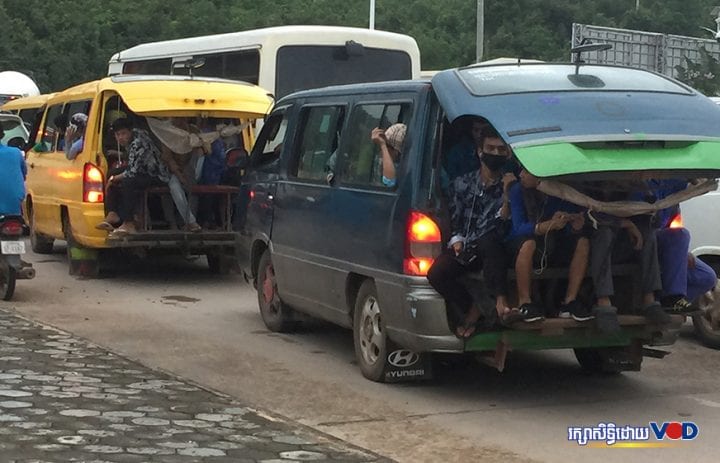
A 30-year-old worker at Paladin Lake (Cambodia) Factory – a manufacturer of wooden floor tiles – spoke on condition of anonymity that in the factory where he is working nowadays there is an excessive wage deduction from 20 to 30 dollars a day for workers who take sick leave without proven medical certificate or take unauthorized leave of absence.
He said the factory used to force workers to do the work different from their skills. Then, due to poor working condition, he said, he decided to move to work in the Sihanoukville SEZ moving from one factory to another, and that he had so far worked for five factories already.
In addition, he said, the workers were forced to work overtime for longer hours than what is permitted by the law meaning that they worked late until 8 or 9pm almost everyday.
“(1) During working hours, if we can’t go to the toilet too often. They set the amount of work and number of hours for us to work and if we do not work enough hours they may fire us or sometimes they use us in a technically wrong way. We are skilled in electricity, they have us work on something else to find a pretext to fire us,” said the worker.
Chetra Thearith, administration director of Paladin Lake Factory, said on November 4 that the factory never forced any worker to work overtime. He said overtime work was on a voluntary basis, and that the overtime was only required when there were increased order from buyers, and the company also boosted the morale of the workers by buying them food and water and so on.
The administration director added that as for leave, the company complied with the labor law and had never made excessive wage deduction as alleged. He said that the workers were not required to work on the jobs different from their skills, and that there has been no any complaints from workers so far this year.
“(2) For other factories, I don’t know, but for my factory, there are no coercion, no wage deduction at all. There are only things that benefit them. Even for overtime beyond 6:20 until 7pm or 8pm, the company provides them with food,” said the factory’s administration director.
Chetra Thearith said that the factory did not have any union and that it would not make any difference if the factory has or has not a union because the factory always complies with the labor law. As for employment contracts, he said, the Paladin Lake factory implemented the three-month contract. Mr. Chetra said if the workers were seen to perform well, the contract would then be extended to six months.
Not far from the Paladin Lake factory is another factory called World Luck factory that produces bags. A worker from Prey Nub district who asked not to be identified and who currently works for the factory said her family had a debt of around US$2,000. She has to pay over $100 to the bank on a monthly basis. She said the factory did not have an infirmary, and that a physician would just show up when there was an inspection visit by the ministry of labor. There is no any union here, she said.
“(3) We have to bear and keep on working because we have a debt. Factory workers nowadays are afraid of being fired. We need to pay debt,” she said.
Another factory named Y Tech? produces underpants in the Sihanoukvillle SEZ. A worker who claims to be a Preah Sihanouk provincial resident says he currently works at this factory. He says he has so far changed five factories. On condition of anonymity, he says, some factories did force workers to work on jobs different from their skills. And with this regard, he adds, many workers seem afraid to file a compliant with the ministry of labor for intervention fearing that they would be targeted for employment contract termination if the companies find out.
The man in his twenties tells that there is not any union in the Y Tech factory and that employment contracts in this factory are only for a period of three months.
“(4) In the factory, the Chinese are noisy. People protested twice already asking that [the Chinese] make a contract to not use abusive language against workers and this is the main issue,” the man adds.
An accounting assistant at the Y Tech factory who asks not to be named says there have been some labor disputes here at the factory. But, she says, the disputes have arisen when a Taiwanese supervisor did not understand the habit of the workers. At the moment, she adds, the factory has a Malaysian owner and there is no issue now.
For overtime work, the accounting assistant says, it is on a voluntary basis and no-one has been forced to work.
“(5) Generally speaking, there are some minor problems because before the Chinese have no knowledge of the local habits and they are a bit hard and sometimes they use strong tone when they speak [to workers], but now things are normal,” she says.
According to the accounting assistant, the employment contracts are for a period of six months for workers who have worked for two years or over. The assistant says the Y Tech infirmary has on-duty labor physicians and a reasonable canteen. The factory, she adds, has no union but has only two workers’ representatives.
The workers at the Y Tech factory acknowledge that there are workers’ representatives. They say the representatives could help monitor the general working conditions, for example, in cases of lack of production materials or help workers when they need something. However, the workers say the workers’ representatives could not help when there are major cases of right violations in the factory.
A 2017 research report of ACILS identified a number of challenges facing workers in the Sihanoukville SEZ. Among the issues is a wage deduction of around US$ 20 if a worker fails to report to work for one day. The report also found that there were cases of forced overtime and that in some cases the overtime was without pay and in other cases the overtime ran late until 11pm.
Coordinator for Sihanoukville province for the Labor Union of Cambodia Mr. An Rama said this particular SEZ does not have enough unions. Among more than 100 enterprises, he says, almost none of them have a union, especially a union that is independent from the government or the employers is totally absent. In the absence of an independent union, he adds, the workers have lost their voices because they do not have their representatives.
“(6) It means that for complaining procedures and document preparation, they [workers] do not understand, and this causes them to have problems. Generally speaking, lack of enough unions working in the SEZ and absence of independent unions in the SEZ mean that rights of the workers are violated and their benefits exploited. More particularly, when there is a problem, they [workers] have no voice; they do not have representation and defense, and do not have any representatives in negotiations who would protect their interests,” he says.
A CCHR report published in early October 2018 revealed that working condition issues such as use of cheap labor and lack of rules and regulations related to wages before the adoption of the minimum wage law in July 2018 have led to labor exploitation, excessive hours of work and low wages.
Moreover, there have been severe restrictions on freedoms of expression, of assembly and of association while members of the unions and associations were banned and freedoms breached. The report said some unions – an apparent reference to independent unions – have faced discrimination, threats and, sometimes, violence as well as harassment from the judicial system.
Cambodian Confederation of Unions president Rong Chhun explains that an independent union is one that stands for the interests of the workers, protect the workers and are not under the influence of the government or the employers. He says if a union is under the influence of the employers or the government, it cannot fully protect the interests of the workers.
“(7) If you create a union just to side with the employers, you create a union just to side with the ministry of labor, you can’t protect the workers. Those who violate workers’ rights are employers and some ministry officials who collude with employers through corruption. So, we cannot protect workers if we create a union just to shelter under the roof of the employers or the ministry of labor,” he adds.
Deputy secretary-general of the Garment Manufacturers’ Association in Cambodia (GMAC) Mr. Kaing Monica said on October 16, 2018 that in the Sihanoukville SEZ there are around 20 companies out of more than 100 companies that are members of GMAC, but said he did not know which factories are not GMAC members.
He says if there are cases of violations of workers’ rights and working conditions, it is not too difficult to solve. The workers could file a complaint with the provincial department of labor of Sihanoukville.
“(8) As we already know overtime work is on a voluntary basis. No-one can force [workers]. They can protest anytime if they see that their employers force them to do overtime work. It is also the case for the issue of a union, if things are not in compliance with the labor law, our workers can file a complaint with the Sihanoukville provincial department of labor,” he adds.
Coordinator for the Cambodian Confederation of Unions for Sihanoukville province Mr. An Rama said that in the past he used to organize and create three local unions within the Sihanoukville SEZ: first one was in Chinese-owned Jinchenyuan Factory that produces socks; second one in Galey Global Cambodia (GGC) Factory that produces garments for export; and third one in Pacific Home Factory.
Mr. Rama says since 2016 CCAWDU has been totally absent from the Sihanoukville SEZ. The reason, he adds, is GGC Factory had dismissed some leaders and activists of CCAWDU and the factory had closed due to bankruptcy.
Another factory – Jinchenyuan – fired more than 10 union leaders and activists in late 2014. The pacific home factory where workers just elected their representatives and were about to create a union when the representatives resigned.
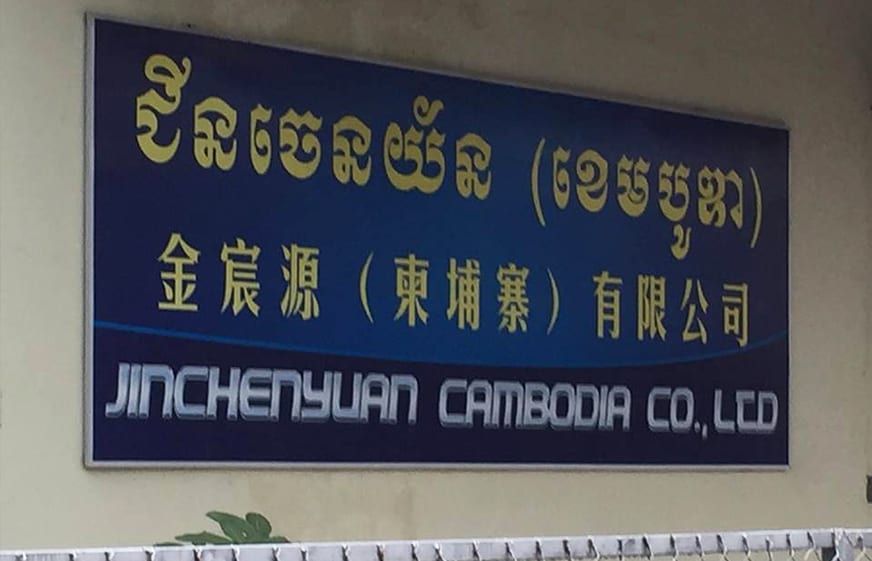
The reason, he adds, that they quitted their job is that they couldn’t bear the working pressure and the fact that they could not help workers because if anyone dared to come out and protect the workers, he or she will get dismissed.
After his union members were fired by the Jinchenyuan Factory, Mr. An Rama says, most of them could not get a job in the SEZ because of discrimination, and it appeared that the SEZ didn’t want to have any independent union.
(9) “I think it is unfair and not right and it is not good at all because the entire SEZ is controlled by the Chinese. The purpose of creating an SEZ, as we know, is that the government wants to create job opportunities for the Cambodian people. But, when our Cambodian fellows apply for a job there, especially union people, they are being discriminated against, for example, there is a display of portrait pictures of them as if they were convicted criminals. But we know that right to establish a union and right to participate in union activities are stipulated in the laws,” he says.
In 2014 and 2015, leaders and activists of CCAWDU at some factories including Jinchenyuan, GGC, Vantage River Jack Style, Hongdo International and so on had lettered the officials of the Cambodian Confederation of Unions in Sihanoukville province for intervention. In the letter, they said they were dismissed by the companies for different reasons such as leave without notice and some had their contracts discontinued due to lack of orders from buyers so that the companies needed to lay off staff.
The letter from the workers said that the companies failed to compensate them in accordance with the labor law for their dismissal. According to the letter, some workers were not allowed to return to work even though the arbitration council had ordered the companies to accept the workers back and let them continue their work.
The same letter said the workers at the Jinchenyuan factory not only demanded that the company pay their salary but also demanded the company to accept them back to work as well as reinstated their wages until they return back to work. However, the workers said that the company forced the workers to thumb-print to resign from their job before the company paid them.
San Sokha is former worker who had been dismissed. He is also a former secretary of CCAWDU. San Sokha says after the Jinchenyuan factory fired him in late 2014, he applied for a job at another factory in the SEZ but after one or two months’ work, the factory terminated his contract without any valid reason.
He says he was dismissed at that time after he protested against the company’s failure to pay overtime pay to the workers for several months and excessive wage deduction when workers took unauthorized leave.
(10) “We just want to form a union to ensure smooth resolution of the workers’ difficulties but we are being discriminated against. I think they do not value us. We want to request for help for us to be reinstated. Even though I am a unionist, they should allow me to work in the SEZ just like others,” he says.
A copy of employment contract with the Jinchenyuan factory obtained by VOD revealed that in 2018, the factory applied an employment contract with a period of three months only.
A labor dispute at the Jinchenyuan factory was submitted to the arbitration council in late 2014 for resolution, and then the case was referred to the court, but has not been solved.
The December 2014 order by the arbitration council said that the labor dispute at the Jinchenyuan factory could not be conciliated because the workers’ party demanded that the factory not discriminate against CCAWDU leaders and activists. The factory rejected the demand and did not accept the eleven CCAWDU leaders and activists back to work for the reason that their contracts already ended in December 2014.
In its order, the arbitration council ordered the factory to reinstate the ten employees including San Sokha back to their jobs as well as pay their unpaid wages from the date of dismissal till the date of reinstatement but the ten CCAWDU leaders and activists did not return back to work in the factory.
Chief administration officer at the Jinchenyuan factory Mr. Chan Sambo said on November 1, 2018 that he has just worked at the factory for just four or five months. He says he did not know what happened in the factory before he started work here. Since 2017, he adds, the socks-producing factory has changed its buyers and reformed a number of its production chains as well as working conditions for the workers.
Mr. Chan Sambo said that the factory implemented an overtime schedule of two hours a day and the overtime was on a voluntary basis without any coercion, and the consent was even thumb-printed or signed by the concerned workers. Moreover, he adds, overtime pay was calculated and included in the wage package.
Mr. Sambo also said the factory had a principle to train workers on various laws and regulations as well as on how to prevent work-related risks in collaboration with officials from ILO as well.
(11) “Because I am new here, I do not know much about what has happened before. I don’t know if the factory had any conflict with the workers or not before, but as for now, since I started work here there’s no problem. If there is any problem, we work together because sometimes we need to change the day-off for public holidays, and if workers do not agree, the factory will just follow them. They say they do not have transportation means and that they need to spend a lot, so we’ve never forced them. We just follow the laws,” he adds.
Mr. Sambo emphasized that the factory has a reasonable canteen and provide workers with lunch, and also, it has one on-duty physician.
Mrs. Det Nhanh, who also works at the Jinchenyuan factory says that after change of buyers and new administration officer, there has not any excessive wage deduction and the factory did pay overtime for the workers perpetually and lunch has been provided for the workers. However, she adds, the factory has no union like it did before.
Mr. Chan Sambo confirmed that there is no union, but there are four workers’ representatives in the factory. He says former CCAWDU leaders and activists, who were fired, no longer work here at the factory.
The chief administration officer said that the four workers’ representatives, besides working their normal jobs, could also help workers on working conditions-related issues and could convey workers’ concerns to the factory’s management as well as convey the words of the factory back to the workers, but it is not the same as the union.
In late October 2018, VOD sent two emails to the marketing and general service official at the Sihanoukville SEZ known as Mr. Wang for further enquiry on the challenges raised by the workers and asked for contact information of the general manager there. Mr. Wang confirmed the receipt of those emails but he did not give any information as of mid-November 2018.
Mr. Mey Kin, representative of the Ministry of Labor and Vocational Training in charge of the Sihanoukville SEZ, said that he has not received any complaints on labor disputes here in the SEZ. He said there has not been any cases of labor rights violations. He said the ministry does not allow any wage deduction. Mr. Kin told that he used to receive a complaint related to the dismissal of workers but he has conciliated the case between the employer and the workers.
(12) “As for the overtime, it is on a voluntary basis and in case any worker does not want to work overtime, the employer has to allow him or her to take rest at home. As for wage deduction, the ministry has been tough on this issue. Therefore, there has not been any case of excessive wage deduction. In case a work does not report to work on a specific day, he or she does not receive the wage for that day,” he adds.
Article 15 of the labor law reads that forced or compulsory overtime shall be prohibited.
Article 141 of the labor law stipulates that workers may work forty-eight hours a week, and overtime beyond normal working hours may not exceed one hour a day.
Both unions and representatives of the Ministry of Labor and Vocational Training confirmed that there’s only one union in the Sihanoukville SEZ.
The President of the Union of Youth Federations of Cambodia and the Khmer Union Federation of Workers Spirit, Mr. MOM Siek, said that the Sihanoukville SEZ has his union, Khmer Union Federation of Workers Spirit. This union covers six factories”. He added that his union is currently facing challenges in serving the workers because the employers apparently have no intention to see any union in the area.
He stated that in 2016 his union covered 18 companies, but now it covers only 6 companies which is the union’s structure. However, there are only one or two companies that were registered with the provincial department of labor. He said that his union has shrunk because short-term contracts are applied and his union leadership was subsequently terminated from 12 enterprises.
He added that: (13) “as I said earlier, the challenges currently faced by the workers are that they just work for money, but are not happy because they have no authority to make any complaint. They cannot make any complaint-everything depends on the companies’ decision. Whatever said by the companies must be accepted. They are prevented from exercising their rights or providing any comments. The short-term contracts have resulted in their immediate resignation after they have encountered any problem. Ten days or a half month before the due date, they asked for final pay.
An official of the Cambodian Confederation of Unions for Sihanoukville province, Mr. An Rama, said that he had already submitted this union discrimination case to the provincial department of labor. He added that the department had referred the case to the Ministry and the Arbitration Council but no resolution had been reached yet.
In early 2018, in a meeting between Prime Minister Hun Sen with the workers at the Sihanoukville SEZ, he [the Prime Minister] ordered relevant institutions to promote those workers’ welfare and review their employment contracts, finding a way to enable them to obtain long-term employment contracts.
Mr. Mey Kin, representative of the Ministry of Labor and Vocational Training in charge of the Sihanoukville SEZ, said that currently there are several companies or enterprises applying better long-term employment contracts, such as six-month, one-year, or longer-term employment contracts, but he did not know the specific number. “Most factories have on-duty physicians and proper dining places”, he added.
Independent union plays a key role in promoting the respect for the workers’ rights and working condition
Article 266 of the Law on Labor specifies the right to form a union. This article states “A union, without distinction whatsoever and prior authorization, may be formed. The workers have the right to form professional organizations of their own choice for the exclusive purpose of studying, promoting the interests, and protecting the rights, as well as the moral and material interests, both collectively and individually, of the persons covered by the organization’s statutes.
Mr. Mey Kin, representative of the Ministry of Labor and Vocational Training in charge of the Sihanoukville SEZ, stated that the ministry labor official always had meeting with workers at their accommodations and enterprises to explain them about their rights and labor law.
Meanwhile, he encouraged those workers to contact the ministry directly should they counter any problem, so that he would be able to take an immediate action to resolve it. Moreover, he wants more unions in the area to promote the workers’ working condition, but he has never been informed of any restrictions on freedom or discrimination against unions, particularly the independent unions.
He stated that should the aforementioned case occur, the ministry will shortly invite the employers for a correction to enable them to have understanding about the new trade union law.
He stated that an independent union in the area would at least improve the situation. First, the union will improve the working conditions and shortcomings overlooked by the ministry. He said that the union would work directly with the employers, who are the enterprise owners, and whenever a problem is observed by the union, they will be able to make a complaint or raise the case to the office representing the ministry to request an intervention.
Mr. Kaing Monika, representative of the employers for garment and footwear sector, said that the workers may join together to form a union without any discrimination as long as that process is in compliance with the law. He said that should an employer fail to comply with the law, workers and unions are entitled to not only file a complaint with the provincial department of labor, but also to file a complaint with the Internal Labor Organization.
Mr. An Rama is of an opinion that those who may resolve the workers’ challenges and the discrimination against unions, particularly independent unions, include the Ministry of Labor, employer associations, and those who represent the workers or unions. He said that those institutions should take action to resolve the challenges in the SEZ from early 2019 while the Government is paying attention to the workers in garment and other sectors.
Mr. Ath Thun, president of the Coalition of Cambodian Apparel Workers’ Democratic Union, encourage the workers to bravely take part in activities or trainings with a union that has truly protected the workers’ benefits. He encouraged the workers to file a complaint should their right be violated because the union cannot completely represent or help them before they help themselves first.
In a report, the Cambodian Center for Human Rights has urged the Government to guarantee the freedom of associations and unions in the SEZ, serving the workers or their members indiscriminately and without any threats.
Mr. An Rama requested that the relevant institutions, including the Government and employers, establish union offices and union representatives who can work in the Sihanoukville SEZ, so that it will be easy for them to address the workers’ challenges and enhance their awareness on the workers’ rights through trainings or meetings.
Note: Official report is in Khmer version is posted on VOD news website. Click this link: https://goo.gl/JXB62D
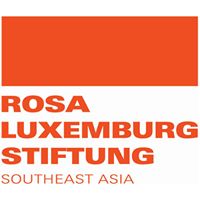 This report is published with the support of Rosa Luxemburg Stiftung with financial means of the Federal Ministry of Economic Cooperation and Development and not for sale.
This report is published with the support of Rosa Luxemburg Stiftung with financial means of the Federal Ministry of Economic Cooperation and Development and not for sale.

